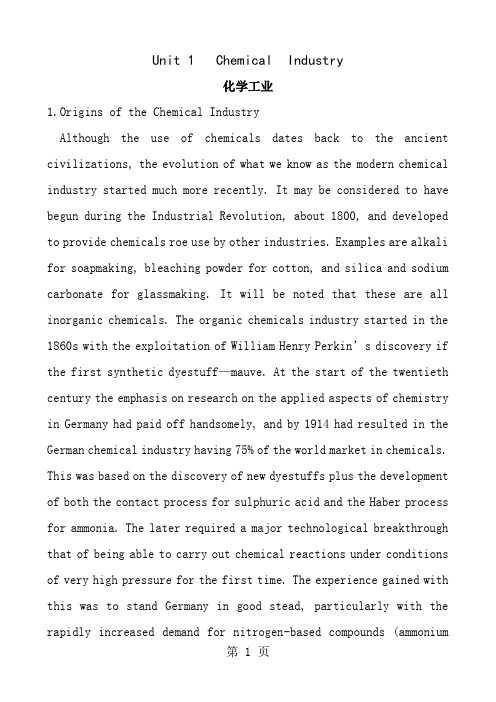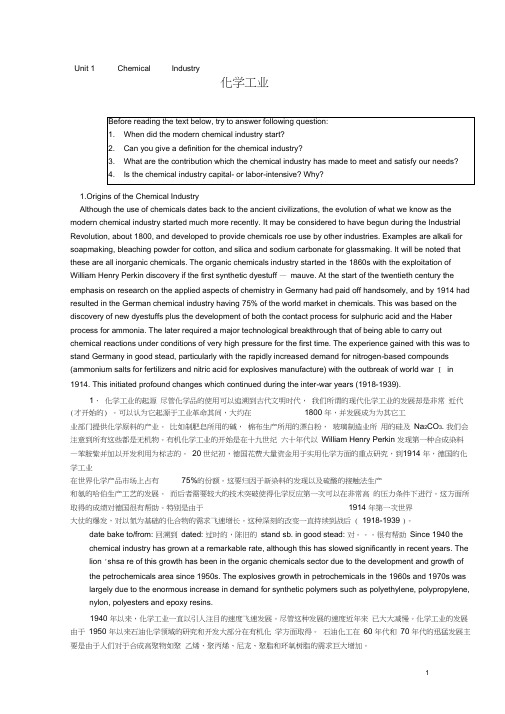《化学工程与工艺专业英语》课文翻译Unit 10 What Is Chemical Engineering
《化学工程与工艺专业英语》中英文翻译

《化学工程与工艺专业英语》中英文翻译Unit 1 Chemical Industry化学工业1.Origins of the Chemical IndustryAlthough the use of chemicals dates back to the ancient civilizations, the evolution of what we know as the modern chemical industry started much more recently. It may be considered to have begun during the Industrial Revolution, about 1800, and developed to provide chemicals roe use by other industries. Examples are alkali for soapmaking, bleaching powder for cotton, and silica and sodium carbonate for glassmaking. It will be noted that these are all inorganic chemicals. The organic chemicals industry started in the 1860s with the exploitation of William Henry Perkin’s discovery if the first synthetic dyestuff—mauve. At the start of the twentieth century the emphasis on research on the applied aspects of chemistry in Germany had paid off handsomely, and by 1914 had resulted in the German chemical industry having 75% of the world market in chemicals. This was based on the discovery of new dyestuffs plus the development of both the contact process for sulphuric acid and the Haber process for ammonia. The later required a major technological breakthrough that of being able to carry out chemical reactions under conditions of very high pressure for the first time. The experience gained with this was to stand Germany in good stead, particularly with the rapidly increased demand for nitrogen-based compounds (ammonium salts for fertilizers and nitric acid for explosives manufacture) with the outbreak of world warⅠin 1914. This initiated profound changes which continued during the inter-war years (1918-1939).1.化学工业的起源尽管化学品的使用能够追溯到古代文明时代,我们所谓的现代化学工业的进展却是专门近代〔才开始的〕。
化学工程与工艺专业英语最全翻译最新整理

Unit 1 Chemical Industry化学工业1.Origins of the Chemical IndustryAlthough the use of chemicals dates back to the ancient civilizations, the evolution of what we know as the modern chemical industry started much more recently. It may be considered to have begun during the Industrial Revolution, about 1800, and developed to provide chemicals roe use by other industries. Examples are alkali for soapmaking, bleaching powder for cotton, and silica and sodium carbonate for glassmaking. It will be noted that these are all inorganic chemicals. The organic chemicals industry started in the 1860s with the exploitation of William Henry Perkin’s discovery if the first synthetic dyestuff—mauve. At the start of the twentieth century the emphasis on research on the applied aspects of chemistry in Germany had paid off handsomely, and by 1914 had resulted in the German chemical industry having 75% of the world market in chemicals. This was based on the discovery of new dyestuffs plus the development of both the contact process for sulphuric acid and the Haber process for ammonia. The later required a major technological breakthrough that of being able to carry out chemical reactions under conditions of very high pressure for the first time. The experience gained with this was to stand Germany in good stead, particularly with the rapidly increased demand for nitrogen-based compounds (ammoniumsalts for fertilizers and nitric acid for explosives manufacture) with the outbreak of world warⅠin 1914. This initiated profound changes which continued during the inter-war years (1918-1939).1.化学工业的起源尽管化学品的使用可以追溯到古代文明时代,我们所谓的现代化学工业的发展却是非常近代(才开始的)。
《化学工程与工艺专业英语》课文翻译

Unit1化学工业的研究和开发One of the main发达国家化学工业飞速发展的一个重要原因就是它在研究和开发方面的投入commitmen t和投资investmen t。
通常是销售收入的5%,而研究密集型分支如制药,投入则加倍。
要强调这里我们所提出的百分数不是指利润而是指销售收入,也就是说全部回收的钱,其中包括要付出原材料费,企业管理费,员工工资等等。
过去这笔巨大的投资支付得很好,使得许多有用的和有价值的产品被投放市场,包括一些合成高聚物如尼龙和聚脂,药品和杀虫剂。
尽管近年来进入市场的新产品大为减少,而且在衰退时期研究部门通常是最先被裁减的部门,在研究和开发方面的投资仍然保持在较高的水平。
化学工业technology industry是高技术工业,它需要利用电子学和工程学的最新成果。
计算机被广泛应用,从化工厂的自动控制a utomatic control,到新化合物结构的分子模拟,再到实验室分析仪器的控制。
Individual manufacturing一个制造厂的生产量很不一样,精细化工领域每年只有几吨,而巨型企业如化肥厂和石油化工厂有可能高达500,000吨。
后者需要巨大的资金投入,因为一个这样规模的工厂要花费2亿5千万美元,再加上自动控制设备的普遍应用,就不难解释为什么化工厂是资金密集型企业而不是劳动力密集型企业。
The major大部分化学公司是真正的跨国公司multinational,他们在世界上的许多国家进行销售和开发市场,他们在许多国家都有制造厂。
这种国际间的合作理念,或全球一体化,是化学工业中发展的趋势。
大公司通过在别的国家建造制造厂或者是收购已有的工厂进行扩张。
Unit 2工业研究和开发的类型The applied通常在生产中完成的实用型的或有目的性的研究和开发可以分为好几类,我们对此加以简述。
它们是:(1)产品开发;(2)工艺开发;(3)工艺改进;(4)应用开发;每一类下还有许多分支。
化工专业英语翻译(全21单元)

化学工程与工艺专业英语课文翻译Unit 1 Chemical Industry化学工业.................................. - 2 - Unit 2 Research and Development研究和开发................. - 7 - Unit 3 Typical Activities of Chemical Engineers化学工程师的例行工作........................................................................ - 13 - Unit 4 Sources of Chemicals化学资源........................... - 20 - Unit 5 Basic Chemicals基本化学品................................ - 25 - Unit 6 Chlor-Alkali and Related Processes氯碱及其相关过程.- 28 -Unit 7 Ammonia, Nitric Acid and Urea氯、硝酸和尿素... - 33 - Unit 8 Petroleum Processing石油加工........................... - 40 - Unit 9 Polymers 聚合物............................................... - 43 - Unit 10 What Is Chemical Engineering?什么是化学工程学 - 49 -Unit 11 Chemical and Process Thermodynamics化工热力学.- 55 -Unit 12 What do we mean by transport phenomena ?如何定义传递现象 .................................................................... - 61 - Unit 13 Unit Operations in Chemical Engineering化学工程中的单元操作 .................................................................... - 66 -Unit14 Distillation蒸馏................................................. - 70 - Unit 15 Solvent Extraction, Leaching and Adsorption溶剂萃取,浸取和吸附 .............................................................. - 75 - Unit 16 Evaporation, Crystallization and Drying蒸发、结晶和干燥.............................................................................. - 81 - Unit 17 Chemical Reaction Engineering化学反应工程.... - 88 - Unit18 Chemical Engineering Modeling化工建模 .......... - 95 - Unit 19 Introduction to Process Design过程设计简介 .... - 99 - Unit 20 Material Science and Chemical Engineer材料科学和化学工程...................................................................... - 105 - Unit 21 Chemical Industry and Environment化学工业与环境-111 -Unit 1 Chemical Industry化学工业1.化学工业的起源尽管化学品的使用可以追溯到古代文明时代,我们所谓的现代化学工业的发展却是非常近代(才开始的)。
Unit-10-What-is-chemical-engineeringPPT课件

What Is Chemical Engineering?
By Li Xia Henan University of Urban
Construction
-
1
Guiding Questions
▪ 1.Can you tell the difference between the chemical engineering and the mechanical engineering?
-
2
Prelude(前言)
In a wider sense, engineering may be defined as a scientific presentation of the techniques and facilities used in a particular industry. For example, mechanical engineering refers to the techniques and facilities employed to make machines.
译:举例来说,今天石油已经成为八万多种化学产品生产的原 材料。一方面是化学加工工业的扩张要求,另一方面是化学和 技术水平的发展为化学工艺奠定理论基础提供了可能。
-
10
on (the) one hand...on the other (hand)…
一方面…..另一方面 注意:
固定搭配,其中括号内的 the 和 hand 均可省略。on the other hand 可单独使用,表示“另一方面”,但on the one hand 不可单独使用。
译:广义来讲,工程学可以定义为对某种工业所用技 术和设备的科学表达。例如,机械工程学涉及的是制 造机器的工业所用技术和设备。
化工专业英语翻译全单元

化学工程与工艺专业英语课文翻译Unit 1 Chemical Industry化学工业..................................................................................... - 1 -Unit 2 Research and Development研究和开发................................................................ - 5 -Unit 3 Typical Activities of Chemical Engineers化学工程师的例行工作 ................ - 11 -Unit 4 Sources of Chemicals化学资源 ............................................................................. - 16 -Unit 5 Basic Chemicals基本化学品 .................................................................................. - 20 -Unit 6 Chlor-Alkali and Related Processes氯碱及其相关过程 ................................... - 22 -Unit 7 Ammonia, Nitric Acid and Urea氯、硝酸和尿素............................................. - 27 -Unit 8 Petroleum Processing石油加工............................................................................. - 32 -Unit 9 Polymers 聚合物.................................................................................................... - 35 -Unit 10 What Is Chemical Engineering?什么是化学工程学 ........................................ - 40 -Unit 11 Chemical and Process Thermodynamics化工热力学...................................... - 45 -Unit 12 What do we mean by transport phenomena ?如何定义传递现象................. - 50 -Unit 13 Unit Operations in Chemical Engineering化学工程中的单元操作 ............ - 54 -Unit14 Distillation蒸馏........................................................................................................ - 57 -Unit 15 Solvent Extraction, Leaching and Adsorption溶剂萃取,浸取和吸附...... - 62 -Unit 16 Evaporation, Crystallization and Drying蒸发、结晶和干燥......................... - 67 -Unit 17 Chemical Reaction Engineering化学反应工程 ................................................ - 72 -Unit18 Chemical Engineering Modeling化工建模 ......................................................... - 78 -Unit 19 Introduction to Process Design过程设计简介................................................. - 82 -Unit 20 Material Science and Chemical Engineer材料科学和化学工程.................... - 87 -Unit 21 Chemical Industry and Environment化学工业与环境................................... - 92 -Unit 1 Chemical Industry化学工业1.化学工业的起源尽管化学品的使用可以追溯到古代文明时代,我们所谓的现代化学工业的发展却是非常近代(才开始的)。
《化学工程与工艺专业英语》课文翻译-完整版

Unit 1 Chemical Industry化学工业1.Origins of the Chemical IndustryAlthough the use of chemicals dates back to the ancient civilizations, the evolution of what we know as the modern chemical industry started much more recently. It may be considered to have begun during the Industrial Revolution, about 1800, and developed to provide chemicals roe use by other industries. Examples are alkali for soapmaking, bleaching powder for cotton, and silica and sodium carbonate for glassmaking. It will be noted that these are all inorganic chemicals. The organic chemicals industry started in the 1860s with the exploitation of William Henry Perkin discovery if the first synthetic dyestuff —mauve. At the start of the twentieth century the emphasis on research on the applied aspects of chemistry in Germany had paid off handsomely, and by 1914 had resulted in the German chemical industry having 75% of the world market in chemicals. This was based on the discovery of new dyestuffs plus the development of both the contact process for sulphuric acid and the Haber process for ammonia. The later required a major technological breakthrough that of being able to carry out chemical reactions under conditions of very high pressure for the first time. The experience gained with this was to stand Germany in good stead, particularly with the rapidly increased demand for nitrogen-based compounds (ammonium salts for fertilizers and nitric acid for explosives manufacture) with the outbreak of world war Ⅰ in 1914. This initiated profound changes which continued during the inter-war years (1918-1939).1.化学工业的起源尽管化学品的使用可以追溯到古代文明时代,我们所谓的现代化学工业的发展却是非常近代(才开始的) 。
化工专业英语翻译全单元

化学工程与工艺专业英语课文翻译Unit 1 Chemical Industry化学工业............................... - 2 -Unit 2 Research and Development研究和开发...................... - 6 -Unit 3 Typical Activities of Chemical Engineers化学工程师的例行工作- 11 -Unit 4 Sources of Chemicals化学资源........................... - 16 -Unit 5 Basic Chemicals基本化学品.............................. - 20 -Unit 6 Chlor-Alkali and Related Processes氯碱及其相关过程..... - 22 -Unit 7 Ammonia, Nitric Acid and Urea氯、硝酸和尿素............ - 26 -Unit 8 Petroleum Processing石油加工........................... - 31 -Unit 9 Polymers 聚合物....................................... - 34 -Unit 10 What Is Chemical Engineering?什么是化学工程学......... - 39 -Unit 11 Chemical and Process Thermodynamics化工热力学......... - 45 -Unit 12 What do we mean by transport phenomena ?如何定义传递现象- 49 -Unit 13 Unit Operations in Chemical Engineering化学工程中的单元操作- 53 -Unit14 Distillation蒸馏....................................... - 55 -Unit 15 Solvent Extraction, Leaching and Adsorption溶剂萃取,浸取和吸附- 60 -Unit 16 Evaporation, Crystallization and Drying蒸发、结晶和干燥- 65 -Unit 17 Chemical Reaction Engineering化学反应工程............. - 70 -Unit18 Chemical Engineering Modeling化工建模.................. - 76 -Unit 19 Introduction to Process Design过程设计简介............ - 80 -Unit 20 Material Science and Chemical Engineer材料科学和化学工程- 84 -Unit 21 Chemical Industry and Environment化学工业与环境....... - 90 -Unit 1 Chemical Industry化学工业1.化学工业的起源尽管化学品的使用可以追溯到古代文明时代,我们所谓的现代化学工业的发展却是非常近代(才开始的)。
- 1、下载文档前请自行甄别文档内容的完整性,平台不提供额外的编辑、内容补充、找答案等附加服务。
- 2、"仅部分预览"的文档,不可在线预览部分如存在完整性等问题,可反馈申请退款(可完整预览的文档不适用该条件!)。
- 3、如文档侵犯您的权益,请联系客服反馈,我们会尽快为您处理(人工客服工作时间:9:00-18:30)。
Unit 10 What Is ChemicalEngineering?什么是化学工程学In a wider sense, engineering may be defined as a scientific presentation of the techniques and facilities used in a particular industry. For example, mechanical engineering refers to the techniques and facilities employed to make machines. It is predominantly based on mechanical forces which are used to change the appearance and/or physical properties of the materials being worked, while their chemical properties are left unchanged. Chemical engineering encompasses the chemical processing of raw materials, based on chemical and physico-chemical phenomena of high complexity.广义来讲,工程学可以定义为对某种工业所用技术和设备的科学表达。
例如,机械工程学涉及的是制造机器的工业所用技术和设备。
它优先讨论的是机械力,这种作用力可以改变所加工对象的外表或物理性质而不改变其化学性质。
化学工程学包括原材料的化学过程,以更为复杂的化学和物理化学现象为基础。
Thus, chemical engineering is that branch of engineering which is concerned with the study of the design, manufacture, and operation of plant and machinery in industrial chemical processes.因此,化学工程学是工程学的一个分支,它涉及工业化化学过程中工厂和机器的设计、制造、和操作的研究。
Chemical engineering is above all based on the chemical sciences, such as physical chemistry, chemical thermodynamics, and chemical kinetics. In doing so, however, it does not simply copy their findings, but adapts them to bulk chemical processing. The principal objectives that set chemical engineering apart from chemistry as a pure science, is “to find the most economical route of operation and to design commercial equipment and accessories that suit it best of all”. Therefore, chemical engineering is inconceivable without close ties with economics, physics, mathematics, cybernetics, applied mechanics, and other technical sciences.前述化学工程学都是以化学科学为基础的,如物理化学,化学热力学和化学动力学。
然而这样做的时候,它并不是仅仅简单地照搬结论,而是要把这些知识运用于大批量生产的化学加工过程。
把化学工程学与纯化学区分开来的首要目的是“找到最经济的生产路线并设计商业化的设备和辅助设备尽可能地适应它。
”因此如果没有与经济学,物理学,数学,控制论,应用机械以及其它技术的联系就不能想象化学工程会是什么样的。
In its early days, chemical engineering was largely a descriptive science. Many of the early textbooks and manuals on chemical engineering were encyclopedias of the commercial production processes known at the time. Progress in science and industry has bought with it an impressive increase in the number of chemical manufactures. Today, petroleum for example serves as the source material for the production of about 80 thousand chemicals. The expansion of the chemical process industries on the one hand and advances in the chemical and technical sciences on the other have made it possible to lay theoretical foundations for chemical processing.早期的化学工程学以描述性为主。
许多早期的有关化学工程的教科书和手册都是那个时候已知的商品生产过程的百科全书。
科学和工业的发展使化学品的制造数量迅速增加。
举例来说,今天石油已经成为八万多种化学产品生产的原材料。
一方面是化学加工工业扩张的要求,另一方面是化学和技术水平的发展为化学工艺建立理论基础提供了可能。
As the chemical process industries forged ahead, new data, new relationships and new generalizations were added to the subject-matter of chemical engineering. Many branches in their own right have separated from the main stream of chemical engineering, such as process and plant design, automation, chemical process simulation and modeling, etc.随着化学加工工业的发展,新的数据,新的关系和新的综论不断添加到化学工程学的目录中。
然后又从主干上分出许多的分支,如工艺和工厂设计,自动化,化工工艺模拟和模型,等等。
1. A Brief Historical OutlineHistorically, chemical engineering is inseparable from the chemical process industries. In its early days chemical engineering which came into being with the advent of early chemical trades was a purely descriptive division of applied chemistry.1.简要的历史轮廓从历史上来说,化学工程学与化学加工工业密不可分。
在早期,化学工程学随着早期化学产品交易的发展而出现,是应用化学的纯描述性的分支。
The manufacture of basic chemical products on Europe appears to have begun in the 15th century when small, specialized businesses were first set up to turn out acids, alkalis, salts, pharmaceutical preparations, and some organic compounds.在欧洲,基础化学产品的制造出现在15世纪。
一些小的、专门的企业开始创立,生产酸、碱、盐、药物中间体和一些有机化合物。
For all the rhetoric of nineteenth-century academic chemists in Britain urging the priority of the study of pure chemistry over applied, their students who became works chemists were little more than qualitative and quantitative analysts. Before the 1880s this was equally true of German chemical firms, who remained content to retain academic consultants who pursued research within the university and who would occasionally provide the material for manufacturing innovation. By the 1880s, however, industrialists were beginning to recognize that the scaling up of consultants’ laboratory preparations, and syntheses was a distinctly different activity from laboratory investigation. They began to refer to this scaling problem and its solution as “chemical engineering”—possibly because the mechanical engineers who had already been introduced into works to who seemed best able to understand the process involved. The academic dichotomy of head and hand died slowly.由于十九世纪英国的学院化学家强调纯化学的研究高于应用化学,他们的要成为工业化学家的学生也只是定性和定量分析者。
